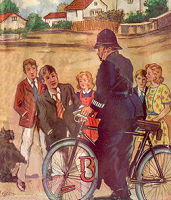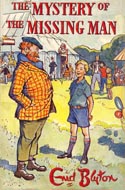
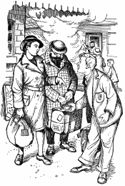
Fatty meets Mr Tolling at the station—along with his awful daughter Eunice!
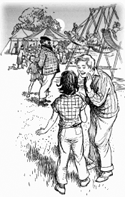
Fatty tells Daisy he's spotted Mr Goon—in disguise!
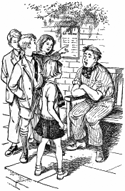
A disguised Fatty asks when the next bus is due.
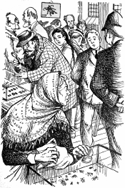
The old woman turns and gives Fatty a hard stare.
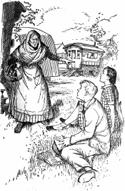
"Get out of here!" the old woman says angrily to Fatty and Eunice.
The Mystery of the Missing Man
Review by Keith Robinson (February 13, 2005)
The thirteenth book in the series introduces Mr Tolling, an old school friend of Fatty's father who comes to spend a week with the Trottevilles so he can attend the coleopterists' conference at a fair in Petersood. Coleopterists are of course beetle-lovers, and not (as the gang joke) owners of collie dogs, growers of cauliflowers, or sufferers from colly-wobbles. Mr Tolling is rather like a beetle himself, a small man with a huge black beard, large glasses and always wearing a dark suit. He's very likeable, even if he is a little boring, always going on about beetles and how fascinating they are. He's extremely eager to get along to the coleopterist meetings, which are being held at Petersood's Town Hall.
But Mr Tolling—or Mr Belling as Fatty mistakenly calls him at first—pales into insignificance compared to his daughter Eunice, who has come along to stay with the Trottevilles as well. Fatty is supposed to entertain her during her stay, and she's ready and willing to join in with whatever Fatty and his friends are doing...but she's domineering, and her highly efficient, extremely helpful attitude for some reason rubs Fatty and the others up the wrong way! In short, she's "simply awful." As a reader I found myself liking her right from the start. When Fatty mistakenly called her father Mr Belling (because bells toll), she responds by suggesting she call him Frederick Canterville instead. Throughout the book she is smart and witty, but Fatty doesn't want her overbearing company and politely escapes wherever possible.
The mystery starts when Fatty dresses up as a tramp in an effort to shake off Eunice. He puts on his disguise and then hides out in his shed—and Eunice peers in through the window and screams at the sight of "an intruder in Fatty's shed!" Mr Goon is nearby and comes to the rescue, demanding that the tramp show himself—so poor Fatty bursts out of the shed and takes off with Buster, who is barking excitedly around his feet. Naturally Mr Goon makes out afterwards that the tramp was strong, very strong, and Buster must have taken large chunks out of the tramp's ankles as he tried to escape...Surprisingly Eunice joins in with the embellishing!
Chief Inspector Jenks (more on his apparent demotion in a moment) visits Goon and tells him to be on the lookout for a dangerous escaped criminal, who has a nasty scar above his lip but is a master of disguise so can hide it pretty well with a beard. There's a moment that made me laugh out loud, when an astonished Mr Goon realizes the tramp might be the man they're after. "I saw this man yesterday!" he said excitedly, and actually poked the Chief in the chest. I don't know why, but the vision of Goon's excited expression and his poking the stern Chief in the chest struck me as hilarious. It wouldn't have been so funny if Blyton hadn't used the word "actually" to get across that people like Goon do NOT poke Chief Inspectors in the chest.
Speaking of which...Jenks was promoted two books ago, and was Superintendent throughout The Mystery of Holly Lane and The Mystery of Tally-Ho Cottage. Now he's back down to Chief Inspector, and I've already checked and confirmed that in the next book, The Mystery of the Strange Bundle, he's back up to Superintendent again. So why this sudden lapse? I can think of only two reasons: either Enid Blyton made a huge gaff and forgot Jenks was a Superintendent, OR she wrote this earlier than we think but it got put aside for a few years. If you go by Jenks' rank alone, this book had to have been written sometime after Invisible Thief (the last book he was a mere Inspector) and before Holly Lane (when he's a Superintendent). Or, as I say, Blyton just messed up.
The mystery in this book is: Where is the criminal? Is he in disguise, and if so, who is he? Sadly I guessed who the missing man was disguised as very early on, and the evidence was in Blyton's avoidance in mentioning a certain someone as a possible suspect. The Find-Outers went around the fair looking for someone of medium height with knobbly hands, a scar above their lip, and a love of cats and insects. Curiously they latch on to a brother and sister, the Fangios, who actually look like the criminal, are of the same height and build, have a cat, and run a flea circus. The Fangios, however, clearly have no scars...but without giving the ending away to those who haven't read the book, it seemed pretty obvious to me who the criminal was and the ending was, therefore, a case of the reader grumbling, "Yes, I already knew that!"
Okay, so I'm not exactly the right age for the intended audience, but I remember guessing this one when I read it at age seven or eight. The clues in this book are actually pretty good, suitably puzzling, but somehow Blyton failed to conceal the twist. I can now appreciate just how good Burnt Cottage, Disappearing Cat, and Invisible Thief are for delivering that startling resolution at the end. And unlike those earlier stories, in Missing Man Fatty doesn't even get that "final clue" or "innocent comment by Bets" to provide that final flash of inspiration. Here his flash of inspiration comes along right at the opportune time, but for apparently no reason.
But it's a strong book, despite the disappointing (at least for me) ending. Eunice and Mr Tolling certainly fill this one out and make it a very enjoyable read—and we have the funny vision of Fatty in running shorts trying to get fit!


